Letter From the Dean
Greetings!
Since our last impact report in 2020, the world has changed. What hasn’t changed, what in fact is front and center for many of us, is the crucial work of this college. We know now (as if we’d had any reason to wonder) just how important sufficient numbers of well-trained graduates in the medical and clinical fields are. How important credible, evidence-based research is. How important meaningful internships are. How important committed and caring instructors are. How important relationships with stakeholders and leaders in the field are.
Much of what you will find in these pages, based on Boise State’s Blueprint for Success and the goals established in that plan is centered on the following five areas:
- Improve educational access and student success
- Innovation for institutional impact
- Advance research and creative activity
- Foster thriving community
- Trailblaze programs and partnerships
These pillars have provided for us a durable, reliable structure to grow on through unprecedented circumstances.
Programs, initiatives, courses, research, internships — virtually no area of our college has been left untouched. COHS, Boise State and the Bronco community are coming out of the far side of the global health crisis stronger. More nimble. More innovative. And more caring.
I hope you find yourselves reflected in these pages and inspired by what you have helped to create. Thank you for being part of the legacy we build together. Go COHS, and go Broncos!
Tim Dunnagan
Dean, College of Health Sciences
What College Of Health Sciences Students Are Saying…
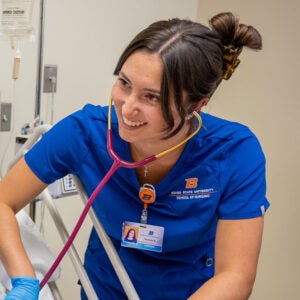
Nicolette Missbrenner
Nursing Student
“I feel like I am ready to tackle the world and I’m at a point in my career at Boise State where I can understand why I’m doing what I’m doing.”
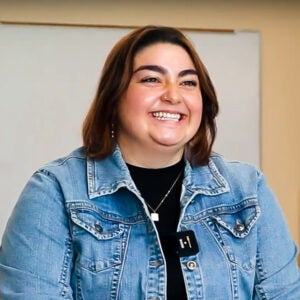
Maya Piper
Bachelor of Science in Health Studies
Graduated May 2023
“The thing I love best about Boise State is the enthusiasm everyone has — not only the students but the professors are proud to be here and want to be here. I’ve met a lot of amazing professors who are willing to help students and go out of their way.”
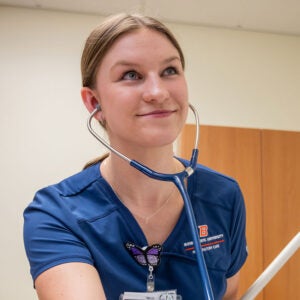
Ashley Stafford
Respiratory Care Student
“In my career, I hope to make people feel better. We see people in very vulnerable positions. Sometimes we’re the last person that can give them love in many situations. So I just hope to fill my career with love and passion in the hospital as well as try to make an impact on the people I meet.”
Improve Educational Access and Student Success
Boise State’s College of Health Sciences is a priceless community resource, equipping the health care professionals of the future with a relevant, cutting-edge education and marketable skills. We work in partnership with industry leaders to enhance the reputation of the university, improve the quality of life in the region and support Idaho’s position in the nation and the world. The college models what it teaches and researches: healthy and innovative ways of living, learning and working.
COHS By the Numbers
26% of undergraduates on the Dean’s List with GPA of 3.5+
37%
90th
34%
Enrollment and Degrees
COHS Scholarships
128
$8.2M
$1M
General Cost of Attendance for Idaho Residents
Jacob Allen on his student job as a peer academic advisor
“I saw the impact my role had on pre-nursing students. It was rewarding to see students feel confident in their academics and connected to the student nursing community.”
The College of Health Sciences delivers high-touch, personalized advising that starts before students’ first day of classes. They receive practical experiences and knowledge guided by committed, compassionate instructors who continue to root and advocate for graduates long after the pomp and circumstance.
Clinicals and Field Placements by the numbers
1,167
14,004
1,300+
In The Field
Amanda McGoldrick
Bachelor of Science in Respiratory Care
Expected graduation
December 2024
“I really like the clinicals where I have the ability to go and actually do patient care and that I’m able to apply what I’ve learned in class to patient care. I think that’s pretty crucial because you can’t go into a field without having any knowledge or experience, and so I feel like having that background has been really nice to apply those concepts in real life.”
Innovation
COHS leadership, in collaboration with students, graduates and leaders in the field, are envisioning and delivering the programming that today’s health care demands. With a shortage of genetic counselors nationwide, Boise State created the first fully online genetic counseling program in the U.S. Utilizing simulation experiences helped the School of Nursing to expand their pre-licensure cohort from 60 to 80 students.
Boise State and the Healthcare Financial Management Association partnered to create the new Master of Population and Health Systems Management program. This online program for healthcare administrators focuses on value-based care. Students earn a master’s degree from Boise State and critical financial management certificates from the association simultaneously.
National Excellence
- MSW Online named #1 by Fortune Magazine
- AGNP master’s program named #10 by US News and World Report
- Master’s in Respiratory Care given APEX Award by its accrediting
body Commission on Accreditation for Respiratory Care - Master’s of Population Health Systems Management given the George and Regi Herzlinger Innovation Education Award by its accrediting body the Commission on Accrediation of Healthcare Management Education
Online Education Leader
The College of Health Sciences is a firmly established leader addressing critical workforce needs in Idaho and beyond through our online programs. With a proud history of 16 years in online program delivery, we have successfully nurtured the advancement of healthcare education with 4,642 online alumni.
We enroll more healthcare students online than any other higher education institution in Idaho. This success contributed to the remarkable growth of our online programs across the country, enabling us to transcend geographical barriers and ensure access to affordable, quality education for students across Idaho.
The map below shows the distribution of online students enrolled in the college’s programs. View an accessible table of this data.
Online Program Data
30%
11
Largest
Workforce Ready Broncos
Athletic trainers, nurses, respiratory therapists, public health professionals, genetic counselors, imaging technologists — all are in high demand and the professionals trained at Boise State are known and sought after globally.
What’s the secret? Decades of relationships have been forged among clinics, hospitals and health systems, government entities, industry executives and College of Health Sciences’ administrators and instructors. Other ingredients include steadily growing donor support; connections between graduates in the field and students in the classroom; cutting-edge programming and an appetite to innovate; and meaningful internship, fellowship, and research opportunities. Tenacity on the part of students and faculty members alike ensures COHS grads land the jobs and careers of their dreams — often even before they receive their diplomas and certificates.
New Online Degree
Elke Shaw-Tulloch
“Many of the professionals across the state are eligible for retirement within the next decade,” she said. “I look at the quality of Boise State graduates from all fields and consider Idaho to be very lucky to have an institution with this caliber and connections. The university offers wonderful programs with robust offerings.”Elke Shaw-Tulloch, Bachelor of Science in Environmental and Occupational Health 1992, Master of Health Science 2002, Administrator, Idaho Department of Health and Welfare’s Division of Public Health
Research
COHS Broncos are bold in their thinking and thrilled to partner with colleagues at Boise State and across the globe. Research partnerships that are moving the needle when it comes to the human condition include the collaboration between Boise State’s Department of Mechanical and Biomedical Engineering and the COHS Department of Kinesiology through the Center for Orthopaedic and Biomechanics Research. Students and faculty members take on meaningful questions having to do with human movement — with the potential to change an untold number of lives for the better.
Adrian Rodriguez
“My research experience has strengthened my passion for addressing health disparities and inequalities among marginalized communities.”Adrian Rodriguez
From Field To Lab
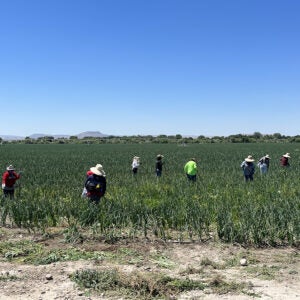
Thinking outside the box often means taking the thinking outside the classroom — sometimes, miles from the classroom. In the School of Public and Population Health, ongoing research in agricultural fields and settings on the impacts of pesticides on farm workers and related environmental risks is critical to our understanding of an increasingly interconnected world.
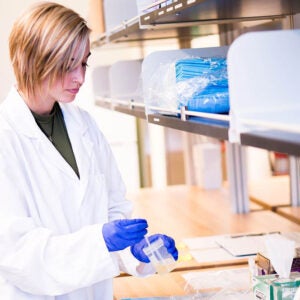
GRADUATE ASSISTANTS: ESSENTIAL TO THE WORK WE DO
Jessica Porter ’15 Bachelor of Science in Environmental and Occupational Health was a research assistant in Boise State’s Agricultural Health Lab. She worked with Cynnie Curl, associate professor for the School of Public and Population Health, to study the effects of pesticide on farmworkers.
Total Research Expenditures
$12M+
University Health Services
Health Services is an integrated clinic supporting student and employee health and well-being.
18,853 Clinic Appointments Total
11,197
7,537
119
Supporting Mental Health on Campus
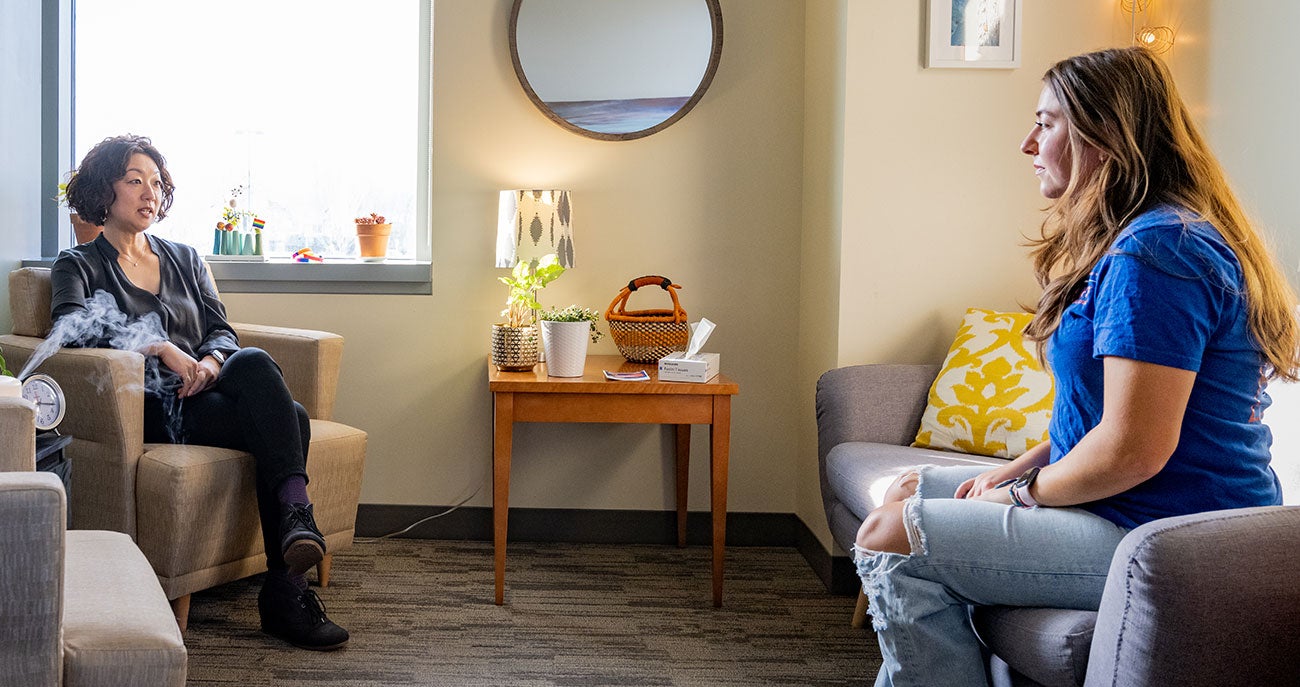
The COHS family — students, faculty and staff — can be counted on to support all those who are part of the Bronco community. Bronco students lobbied to have their own fees increased to ensure their friends and colleagues had access to needed mental health resources. University Health Services within the COHS stepped up and doubled down, expanding its scheduling to meet the increasing mental health and wellness needs of students and employees alike.
Wellness Services – Wellness for Students and Employees
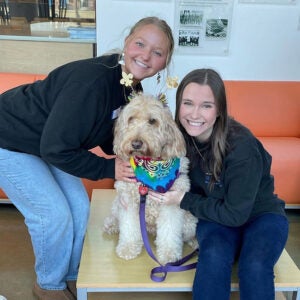
Wellness Services is the wellness division of Health Services. Their powerhouse team partnered with representatives from across Boise State to shape and refresh programming. They have charged ahead, keeping campus on the move with a full slate of active, healthy choices.
Foster Thriving Community
Blue Sky Institute
COHS is proud to play an active part in the Blue Sky Institute and the Student Basic Needs Collaborative, laser-focused on making sure all students have access to sound, and safe nutrition and housing.
Alumni Employees
Spring 2023 Data
130
197
126
32%
42%
49%
Alumni Employees
Travis Armstrong, clinical assistant professor for the Department of Radiologic Sciences, teaches X-ray placement with a high-fidelity manikin. Armstrong graduated with his bachelor’s degree from Boise State in 2000, began precepting for his alma mater in 2017 and joined the faculty full-time in 2020.
Trailblaze Programs and Partnerships
Whether it is funding or donations, the contribution of time, talent and expertise, or the gracious hosting and precepting of students as they hone skills at the bedside, our partners, donors and stakeholders are invaluable to the success of COHS programs and graduates.
Saint Alphonsus
College of Health Sciences students pose with Boise State President Marlene Tromp, Saint Alphonsus CEO Odette Bolano, former Boise State Foundation Executive Chair Brandy Stemmler, Vice President of University Advancement Matthew Ewing, COHS Dean Tim Dunnagan, other college and health system leaders during the Saint Alphonsus Scholars Dinner in fall 2022. Saint Alphonsus has funded $1.8 million in scholarships since 2014.
St Lukes
Peer health educators with Wellness Services, pose on campus. St. Luke’s Health System helped fund our peer health educator program training in 2022. The peer health educators work to better the health and well-being of all Boise State students through educational programming.
Dr. Jim Yong Kim
The COHS community has long fostered the generous flow of information, sharing of resources and job mentoring that is unique among universities of Boise State’s size and caliber. Dozens of instructors also hold positions with local clinics, hospitals and health systems, and executives advise the college regularly, helping to keep curricula fresh and vital.
COHS students and graduates are part of a dynamic global dialogue that in 2022 turned the spotlight on Dr. Jim Yong Kim. Former president of the World Bank Group and a compassionate visionary, he is devoted to improving and championing the health of some of the world’s most vulnerable populations. The COHS community continues to be inspired by his call to action and is excited to host the biennial lecture series.
Total Philanthropic support
$12.6 M
New PhD Program
Our new PhD program in public and population health leadership is one example of how the college is informed by the industry and able to respond to community needs with smart and timely design. The PhD program is the first of its kind in Idaho. Graduates will be qualified for a variety of leadership positions in public and population health and healthcare settings at the local, state, and federal levels, as well as health-focused non-profit organizations, universities and colleges.
Douglas Myers
“The PhD in Public and Population Health Leadership is designed to create a new role, the public health scientist leader, and is an attempt at streamlining public health education at its highest levels.”Douglas Myers
Dedication. Passion. Deep Knowledge.
The leadership, faculty and staff of Boise State’s College of Health Sciences bring decades of experience as seasoned administrators, planners, clinicians and instructors. All together, it’s a track record — and a roster — that’s envied across the country. If Boise State’s Blueprint for Success is the game plan, the College of Health Sciences team is a powerful force on the field, making meaningful impact for the good of COHS students and the larger community.